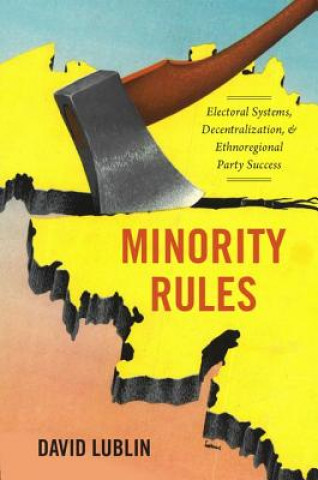
Doručenie
Nákupný poradca





Nehodí sa? Žiadny problém! U nás môžete do 30 dní vrátiť
 Darčekový poukaz
v ľubovoľnej hodnote
Darčekový poukaz
v ľubovoľnej hodnote
S darčekovým poukazom nešliapnete vedľa. Obdarovaný si za darčekový poukaz môže vybrať čokoľvek z našej ponuky.
Minority Rules
 Angličtina
Angličtina
 155 b
155 b
30 dní na vrátenie tovaru
Mohlo by vás tiež zaujímať


When we think of minorities-linguistic, ethnic, religious, regional, or racial-in world politics, conflict is often the first thing that comes to mind. Indeed, discord and tension are the depressing norms in many states across the globe: Iraq, the former Yugoslavia, Sudan, Israel, Sri Lanka, Burma, Rwanda, and many more. But as David Lublin points out in this magisterial survey of minority-based political groups across the globe, such parties typically function fairly well within larger polities. In Minority Rules, he eschews the usual approach of shining attention on conflict and instead looks at the representation of minority groups in largely peaceful and democratic countries throughout the world, from the tiniest nations in Polynesia to great powers like Russia. Specifically, he examines factors behind the electoral success of ethnic and regional parties and, alternatively, their failure to ever coalesce to explain how peaceful democracies manage relations between different groups. Contrary to theories that emphasize sources of minority discontent that exacerbate ethnic cleavages-for instance, disputes over control of natural resource wealth-Minority Rules demonstrates that electoral rules play a dominant role in explaining not just why ethnic and regional parties perform poorly or well but why one potential ethnic cleavage emerges instead of another. This is important because the emergence of ethnic/regional parties along with the failure to incorporate them meaningfully into political systems has long been associated with ethnic conflict. Therefore, Lublin's findings, which derive from an unprecedentedly rich empirical foundation, have important implications not only for reaching successful settlements to such conflicts but also for preventing violent majority-minority conflicts from ever occurring in the first place.
Informácie o knihe
 Angličtina
Angličtina




 Ako nakupovať
Ako nakupovať

























